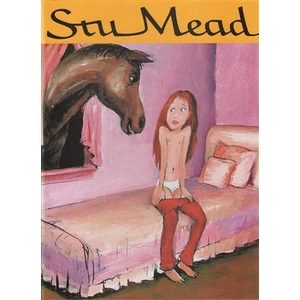At the end of history, at the close of the story of the West that conservative visionaries have been promising, we must publish all the things we have dreamed of even if it might face universal rejection. The people who will be going through the ruins of our civilization should know what we were thinking about, what shaped our opinions and determined our actions – just as we know that ancient Greece was more than a rhetorical exercise and an oasis of puritan civic democracy. This book is being published at a time when war is again more moral than a sexual orgy, a woman cannot beat a man with impunity, America no longer understands Dada and is turning into Sparta, England does nothing other than build houses and make pop music, France has forgotten why it once admired the Marquis de Sade, a
nd Germany is so proper that it prefers to do nothing at all. (...) Has anyone ever understood Stu Mead? It isn’t at all clear from the existing texts. Has Stu ever understood himself, when he often openly regrets the things he has said in media interviews? Yes, but today he chooses his words carefully. The superficial viewer immediately interprets his work as vulgar, and society threatens him with punishment for crimes against the contemporary understanding of the morals of modernity. Perhaps that is one reason why he has turned his back on modern forms and methods even though he was a sensitive virtuoso who could have been a modern master capable of skillfully working with what remained of Surrealism, Suprematism, and Cubism, just like Gerhard Richter in Germany and Peter Howson in England. But in the middle of his artistic career, Stu ceased shaping artistic styles and, just like the disappointed Howson, who let himself be carried away by the bitterness of Christian messianism, Stu Mead gladly succumbed to hell and to an exploration of his pleasures. There is nothing bad about that. If we did not explore the extremes of our imagination, we would not know where to stop in our reality. Even at the risk that we will not recognize it. But we have accepted this risk because we are willing to live our lives in a world of both uncertainty as well as promise.
více
Nejlevnější produkt
51,81 € | knihy.abz.cz | In stock
Máte ve vašem obchodě lepší produkt?
Nejlevnější produkt
51,81 € | knihy.abz.cz | In stock
Máte ve vašem obchodě lepší produkt?
K dispozici v
Co říkají obchody
knihy.abz.cz
Kniha: Stu Mead; Autor: Mead Stuard, Mečl Ivan, Klodová Lenka; At the end of history, at the close of the story of the West that conservative visionaries have been promising, we must publish all the things we have dreamed of even if it might face universal rejection. The people who will be going ...
Knihy Dobrovsky
At the end of history, at the close of the story of the West that conservative visionaries have been promising, we must publish all the things we have dreamed of even if it might face universal rejection. The people who will be going through the ruins of our civilization should know what we were thinking about, what shaped our opinions and determined our actions - just as we know that ancient Greece was more than a rhetorical exercise and an oasis of puritan civic democracy. This book is being published at a time when war is again more moral than a sexual orgy, a woman cannot beat a man with impunity, America no longer understands Dada and is turning into Sparta, England does nothing other than build houses and make pop music, France has forgotten why it once admired the Marquis de Sade, and Germany is so proper that it prefers to do nothing at all. (...) Has anyone ever understood Stu Mead? It isn't at all clear from the existing texts. Has Stu ever understood himself, when he often openly regrets the things he has said in media interviews? Yes, but today he chooses his words carefully. The superficial viewer immediately interprets his work as vulgar, and society threatens him with punishment for crimes against the contemporary understanding of the morals of modernity. Perhaps that is one reason why he has turned his back on modern forms and methods even though he was a sensitive virtuoso who could have been a modern master capable of skillfully working with what remained of Surrealism, Suprematism, and Cubism, just like Gerhard Richter in Germany and Peter Howson in England. But in the middle of his artistic career, Stu ceased shaping artistic styles and, just like the disappointed Howson, who let himself be carried away by the bitterness of Christian messianism, Stu Mead gladly succumbed to hell and to an exploration of his pleasures. There is nothing bad about that. If we did not explore the extremes of our imagination, we would not know where to stop in our reality. Even at the risk that we will not recognize it. But we have accepted this risk because we are willing to live our lives in a world of both uncertainty as well as promise.


